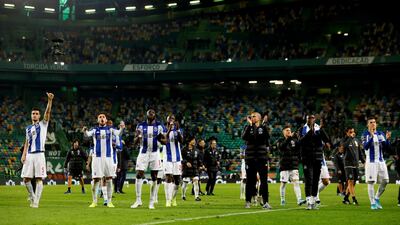A year ago this week, Portugal welcomed a new competition to its territory. The finals of the Uefa Nations League can seem part of a very distant past now, the offspring of a sport ever eager to stock the calendar with new novelties.
The coronavirus crisis has altered perspectives, and, 12 months on, Portugal, like much of Europe, is hurrying merely to find enough dates to complete its basic club schedule.
The Primeira Liga, and the divisions beneath, will on Wednesday follow the path of Germany’s Bundesliga in restarting an interrupted campaign. Portugal’s club football is back in action earlier than Spain’s La Liga, England’s Premier League or Italy’s Serie A partly because the Portuguese government and health service have been a great deal more successful than those countries in containing Covid-19 infection rates.
But standard ‘biosecure’ procedures will still apply: no paying spectators in the stadiums and, in some cases, neutral venues. Santa Clara, of the mid-Atlantic Azores, will not be hosting games on their island, but on the mainland.
Back in the first week of June 2019, Portugal put on a fine show for the Nations League. Cristiano Ronaldo, perhaps the greatest footballer this fertile football country has produced, scored a hat-trick in the opening match against Switzerland; up front next to him that night was a 19-year-old making his full international debut, Joao Felix.
Within weeks, he had become the second most expensive teenager in history, moving from Benfica to Atletico Madrid for a reported €126 million (Dh516.6m).
Meanwhile, Bruno Fernandes played behind Ronaldo and Joao Felix against the Swiss, and joined them in lifting the inaugural Nations League trophy after beating Holland in the final in Porto.
Six months later, he was on his way from Sporting Clube to Manchester United, to be applauded immediately as a recruit of excellent value for the buyers, even at €80m.
The Primeira Liga is weakened a little by the departures of players like Felix and Fernandes, but the pattern has been long established. Portuguese football remains a brilliant nursery of talent. Yet its club economy is limited by the size of the country. For all the distinguished histories of the so-called Big Three, Benfica, Porto and Sporting, they must keep selling players to remain competitive in European tournaments.
This season, they have not been that: that no Portuguese club reached the last 16 of the Champions League raised an eyebrow; that four - Porto, Benfica, Sporting and Braga - were then all eliminated in the first knockout round of the Europa League led to much soul-searching.
As the most celebrated of Portuguese managers once said: “The European Cup is not for Portuguese clubs.” But that was Jose Mourinho playing mind games: when he said it, he was busy taking Porto to triumph in the 2004 Champions League.
_________________
Benfica: Inside the finest finishing school in football

_________________
Sixteen years on, Porto lead the league table, a point above Benfica, so a tight title race over the remaining 10 matchdays is in prospect. There is also an opportunity to spy the next Felix or Fernandes, and very possibly, a preferable platform, without crowds, for the up-and-coming starlets of European football’s westernmost nursery.
Behind-closed-doors football, at least in Germany, has actually opened doors to precocious talents, with managers apparently more willing to give teenagers a first-team opportunity, knowing that without a raucous crowd, pressure on a newcomer is eased.
Take Florian Wirtz, who joined Bayer Leverkusen in January from Cologne, aged 16. He turned 17 last month and made his senior debut away at Werder Bremen immediately the Bundesliga restarted. Peter Bosz, the Leverkusen manager, praised Wirtz’s coolness on his big day - “he was not at all nervous” - and quietly welcomed the fact the debutant could play his creative midfield game without contending with an intimidating Bremen audience.
At Hoffenheim, 17-year-old striker Max Beier played his first full 45 minutes for the club on restart weekend, and, last Saturday, Hoffenheim gave a senior debut, in the starting XI, to central defender Melayro Bogarde, two days after the teenager had turned 18.
The use of five substitutes also helps managers spread opportunities, and although the Portuguese top-flight clubs have not yet approved that post-Covid 19 regulation, they hope to do so later this month.
There will be chances for tyros to shine. Players like striker Romario Baro and defender Tomas Esteves, both of Porto, who were Uefa Youth champions, beating Chelsea in the final, in 2019. At Benfica, right-back Tomas Tavares, 19, and midfielder Florentino Luis, 20, are already established first-teamers. And like all the best young Portuguese, they are already being eyed up as future recruits for the stronger leagues of Europe.


